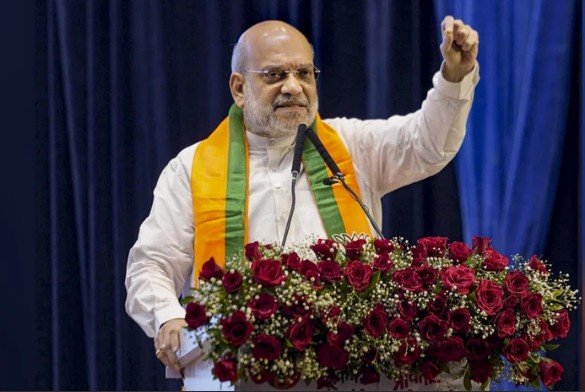Statehood for J&K “at appropriate time”, says Amit Shah; Centre in talks on Ladakh demands, courts will decide on individual cases
Patna, Oct 18: Union Home Minister Amit Shah on Saturday reiterated that statehood for Jammu and Kashmir will be restored “at an appropriate time”, and that the Centre is engaged in discussions to find a “good resolution” to the demands coming from Ladakh. Speaking at a media conclave in Patna, Shah framed the political roadmap as one of consultation and calibrated timing, saying decisions would follow dialogue with regional leaders, including the elected leadership of Jammu and Kashmir.
Addressing the media, Shah described dramatic shifts in the security situation since the abrogation of Article 370. “Jammu and Kashmir has seen a qualitative change,” he said, claiming that militant recruitment from local pools has stopped in the past nine months and that people increasingly feel integrated with the rest of the country. He pointed to the restoration of local democratic processes, panchayat and municipal elections, as well as assembly polls and said Rajya Sabha elections would follow in due course.
On statehood, Shah acknowledged political sensitivities. Responding to Chief Minister Omar Abdullah’s remarks about a remaining gulf with New Delhi over statehood, Shah said such comments may reflect political positioning but reiterated the Centre’s intent: “Statehood will be restored at an appropriate time and it will be done following discussions with him.” He added that the process must respect institutional and procedural norms.
Turning to Ladakh, the home minister said the Union government is in talks with committees from Leh and Kargil and appealed for patience. “We are engaging with their committees. We urge the people to have patience. There will be a good resolution of all their just demands,” Shah said, an apparent reference to ongoing negotiations with bodies such as the Leh Apex Body and the Kargil Democratic Alliance.
Asked about the possible release of educator-activist Sonam Wangchuk, detained in connection with protests in Leh, Shah said the government could not comment on individual judicial matters. “That matter is before the court, and the court will decide on the basis of evidence,” he said, signalling deference to the judicial process.
Shah also used the platform to reiterate the government’s tough posture against internal insurgencies. He described an ongoing, intensified campaign against Maoist groups, offering statistics and a firm timeline. “Over the past decade, we have dismantled many camps and choked the finance and supply lines of Maoists,” he said, adding the government aims to eliminate Maoist influence by December 31, 2026.




